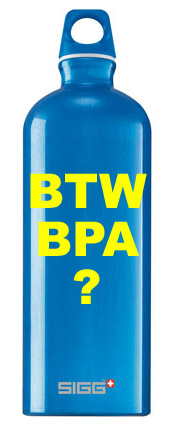Greenscam! Sigg bottles, Aurora organic milk not what they say?
September 1st, 2009. By AbiK
 The horror! Eco-consciousness without conscience! In an industry that thrives on consumer trust, what happens when that trust is comprised by alleged greenscammers?
The horror! Eco-consciousness without conscience! In an industry that thrives on consumer trust, what happens when that trust is comprised by alleged greenscammers?
We’re about to find out. Enter Sigg bottles and Aurora Organic Milk…
Seems all too easy in today’s eco-conscious clime that if you can make it green, talk it up as friendlier, safer, healthier, more sustainable…you’ll have a hit with consumers. Particularly those with deeper pockets as going eco & organic ain’t cheap. Put your eco-friendly product in the right hands—red carpet types—and, like Sigg bottles, trendy cult status may be within reach.
But as with all glowing self-proclamations, stating publicly that you’re “organic” or “eco-conscious” leaves you open to scrutiny. And, trendy or not, Sigg bottles have found themselves in the cross-hairs of pissed off consumers who felt they were led to believe the bottles were BPA-free. Not helping is CEO Steve Wasik’s letter (sigg.com) stating that Sigg bottles produced before August, 2008 contain trace amounts of BPA.
BPA, or bisphenol A, is a potentially toxic substance found in plastics (such as some baby bottles), some dental sealants and linings of metal cans; it’s gained notoriety in recent years since a government panel raised concern in 2007 about BPA leaching from its source and, if ingested—particularly in children—there may be potential for neural and behavioral problems (usatoday.com, 1/30/08).
The initial issue with Sigg had been the issue of leaching; Sigg bottles apparently did not show any BPA leaching. However, Wasik’s letter acknowledges the lack of leaching but then states that there is growing concern over the mere “presence of BPA and some states are considering legislation.”
While the BPA is truly of concern for many, of interest bigger picture is what this will mean for Sigg. The whole eco movement relative to manufacturers and marketers is predicated on trust, integrity and credibility. Hard to rebuild that trust once it’s been blown.
For Aurora milk, in 2007 the company had been found in violation of multiple federal organic standards by USDA investigators. Now, just this week, the Cornucopia Institute (cornucopia.org), an organic industry watchdog, has filed a formal complaint with the USDA charging that one of Aurora’s five industrial-scale dairies has been failing to graze their dairy cattle in accordance with federal organic standards. Specifically, the allegations include that Aurora’s cattle at this particular dairy are confined to barns and pens instead of being able to freely graze outside.
When you buy Costco, Target, Wal-Mart or Safeway store-brand organic milk, chances are you’re buying Aurora—to give you an idea of how big Aurora is. And of how many folks must trust Aurora to be producing organic milk as defined by the USDA.
As more gets out in the media about both Sigg and Aurora, it’ll be interesting to see how each company maneuvers. Meanwhile, if you’re serious about only buying and supporting companies that practice what they preach relative to being organic or eco-friendly, it’s best check in with LawyersAndSettlements.com and check out sites like cornucopia.org, before you check out at the store.
-
Leave a Reply
Archive by Category
- Accidents (24)
- Airlines (9)
- Asbestos Mesothelioma (262)
- Automotive (25)
- Celebrity (14)
- Class Action (84)
- Complaints/Comments (15)
- Consumer Fraud (84)
- Contest (2)
- Court of Public Opinion (5)
- Crazy Sh*t Lawyers See (61)
- Criminal Law (4)
- Defective Products (111)
- DePuy ASR Hip Recall (2)
- Discrimination (22)
- Drugs/Medical (248)
- Elder Care Abuse (4)
- Emerging Issues (462)
- Employment (54)
- Environment (52)
- Financial (28)
- Food Illness (15)
- Human/Civil Rights (4)
- Insecurities (5)
- Insurance (16)
- Intellectual Property (16)
- Internet/E-commerce (19)
- lawsuits (161)
- Lawyers (20)
- Lawyers Giving Back (43)
- Lex Levity (10)
- Personal Injury (106)
- Pleading Ignorance (53)
- Real Estate (2)
- Recall (6)
- Scam (3)
- Securities (13)
- Settlement (81)
- Tort Reform (2)
- Totally Tortelicious (81)
- Veterans (11)
- Whistleblower (9)